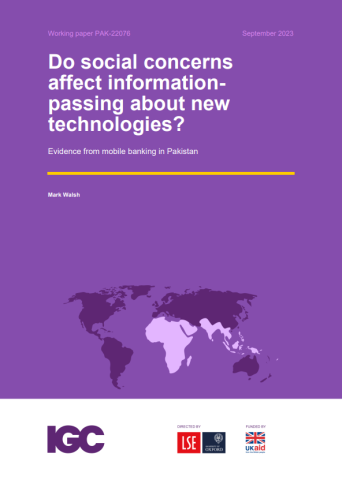-
Walsh Working paper September 2023
PDF document • 1.34 MB
This paper reports on an experiment designed to test whether information-sharing about new technologies is hampered by social concerns–in particular, the fear of recommending at technology that causes a negative outcome for one’s peer, and the fear of offending peers by appearing patronising. The experiment is run in Pakistan and the technology considered is mobile banking. Some individuals (“senders”) were given information about both the growth potential (e.g. ability to save) and the safety concerns (e.g. risk of fraud) with mobile banking, then asked whether they want to share the information with other villagers (“receivers”). I cross-randomise two conditions (known to the senders): whether the receiver is told the identity of the sender, and whether the receiver is told they were specifically targeted by the sender. The key hypotheses are that (a) hiding the sender’s identity reduces the sender’s blame concerns; and (b) hiding the targeting reduces the sender’s offense concerns. Results are consistent with both hypotheses: sharing of the growth pamphlet increases when the sender knows their identity will be hidden; and sharing of the safety pamphlet increases when the sender knows the targeting will be hidden. Heterogeneity by social distance suggests that offense concerns are present only with socially-distant contacts, while blame concerns are present with both close and distant contacts. Together, these results suggest that social concerns are one important factor behind the slow diffusion of information about new technologies.



